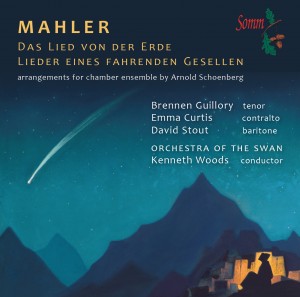Just published at Musicweb-International is a new review by critic Guy Aron of our new recording with Orchestra of the Swan of chamber versions of Mahler’s Das Lied von der Erde and Lieder eines fahrenden Gesellen on Somm. It’s quite an extensive review with a generous helping of historical background and comparison to other recordings. A very short excerpt follows. Given its scope I recommend you read the whole thing at Musicweb.
Purchase here from Presto Classical
Purchase here direct from Somm Recordings
“The wind solos at the first of the Wayfarer songs are quite forward in the balance, and the rhythm is precise; these are to be hallmarks of this recording. David Stout’s characterisation of the vocal line is alternately stoic and sensitive; his breath control copes well with the slow tempo. The second song introduces a feeling of greater animation, with delicate wind playing doubling the vocal line. There is a sense of intimacy here similar to a lieder recital. The smaller orchestral sound registers in the turbulent opening of the third song; this gives way to a calmer mood. The last song begins with a characteristic funeral march. The pulse, faint at the start, gradually firms as the hero prepares himself for his solitary journey, in a resigned but resolute mood. This is a really distinguished Wayfarer cycle; the performance is beautifully played and sung, and has an unerring focus on and sensitivity to the text…. Thomas Allen is not as fresh-voiced as David Stout; together with the more distant recording, this diminishes the youthful feel of the work. The clarity of the Schoenberg arrangement further enhances the attractiveness of the Woods performance…
“The tumultuous opening song again registers the smaller orchestral forces, but with a gain in transparency; the voice is framed by the orchestra rather than having to struggle through it. Brennen Guillory sings intelligently; his Heldentenor reserves are tested by the cruelly high writing. The wind and violin solos are prominent and characterful. The second song paints a picture of depression; the winding oboe and flute solos over the winding string lines are superbly played. Emma Curtis avoids self-pity in her performance, achieving instead a weary resignation, which breaks into a passionate declamation at “Ja, glib mir Ruh”. She has a fresh voice, which reminds me a little of Elizabeth Schwarzkopf’s silvery sound…
“The final song setting, Der abschied, far exceeds the preceding ones in length, being nearly half an hour in duration. Mahler intersperses the text with extended orchestral interludes, scored with both vividness and restraint. The performance by Emma Curtis and the orchestra is one of the utmost sensitivity. The wind and string solos are all prominent, and beautifully played, as before, and Woods’ control of the ebbs and flows of the pulse is unerring… Emma Curtis’s return at “Die Liebe Erde”, however, ushered in a finale that was magical in its tenderness….
“My allegiance will always be to Mahler’s original version; the use of the full orchestra gives the conductor a broader brush and wider range of colours with which to work. However, it isn’t a matter of one being superior to the other; the chamber orchestrations reveal new dimensions to these great works. Woods and his performers certainly mount a convincing case for Schoenberg’s arrangements, which are something that every lover of Mahler should hear.
Guy Aron

Recent Comments